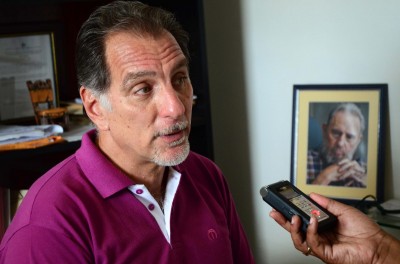November 13th to 16th, 2013 was the 9th International Colloquium for the Freedom of the Five and Against Terrorism held in Holguín, Cuba, at the eastern end of the island, 85 miles west of Guantanamo. The goal of the Colloquium, organized by ICAP (The Cuban Friendship Institute), was to strengthen the unified international strategy to win the release of The Cuban 5; Gerardo Hernandez, Ramón Labañino, Fernando Gonzalez, Antonio Guerrero and René González; men imprisoned in the US for the last fifteen years essentially for fighting terrorism orchestrated in the US. Due to the lack of response from the FBI to stop such attacks, Cuba sent the Cuban 5 to Miami to monitor the organizations perpetrating these acts of violence. The idea was to gather information about similar acts that were in the planning stages in order to derail them before they were carried out.
 One of The Five, René González, was released on October 7, 2011, after serving his entire sentence. On April 22, 2013 René returned to Cuba for his father’s funeral and on May 11, Judge Lenard allowed him to stay there provided that he renounce his United States citizenship. That wasn’t a hard decision for René.
One of The Five, René González, was released on October 7, 2011, after serving his entire sentence. On April 22, 2013 René returned to Cuba for his father’s funeral and on May 11, Judge Lenard allowed him to stay there provided that he renounce his United States citizenship. That wasn’t a hard decision for René.
Soon to be released is Fernando Gonzalez in February. While millions worldwide look forward to this, it is not justice. Justice would be for all five men to have never gone to prison in the first place. The other brothers – Gerardo Hernandez, Ramon Labañino, and Antonio Guerrero – have much too much longer sentences to go and should be freed unconditionally. We still have to work for that.
During my visit to Cuba, I had the honor and privilege of interviewing with René:
Netfa Freeman: I just want to ask you, brother, a few questions to help our listeners understand things more, hopefully be fortified with information. I want to say this is an honor and thank you for giving me this interview.
I’m reading Stephen Kimber’s book right now. First is, I understand that you were born in the US. Your family, your parents moved to the US before the Cuban revolution and then ended up moving back afterward. So the first question is really what knowledge and information might your parents have imparted to you or shared with you that gave you your political consciousness and your commitment to the Cuban Revolution? And particularly if you could share how that might have influenced your choice to fight in Angola. You were one of those who served in Angola against apartheid South Africa, to help Angola get its independence.
René González: I want to start by advising everybody to read Kimber’s book. In my opinion it’s the best thing that’s been written about the case. He did great research. He wrote a book which is tied to the facts, to the most elemental things. So it’s a good way to get acquainted with the case, which on the other side is a very complex case. Now you say my parents. They are working class Cubans who by different ways ended up in the States in the 50’s. They met there and I was born in 1956. Then in 1959 came the Cuban Revolution. Since the beginning of the revolution they felt sympathy for the goals and the purpose of the revolutionary process. So they decided to come home in 1961.
It was an interesting time to be in Cuba…
